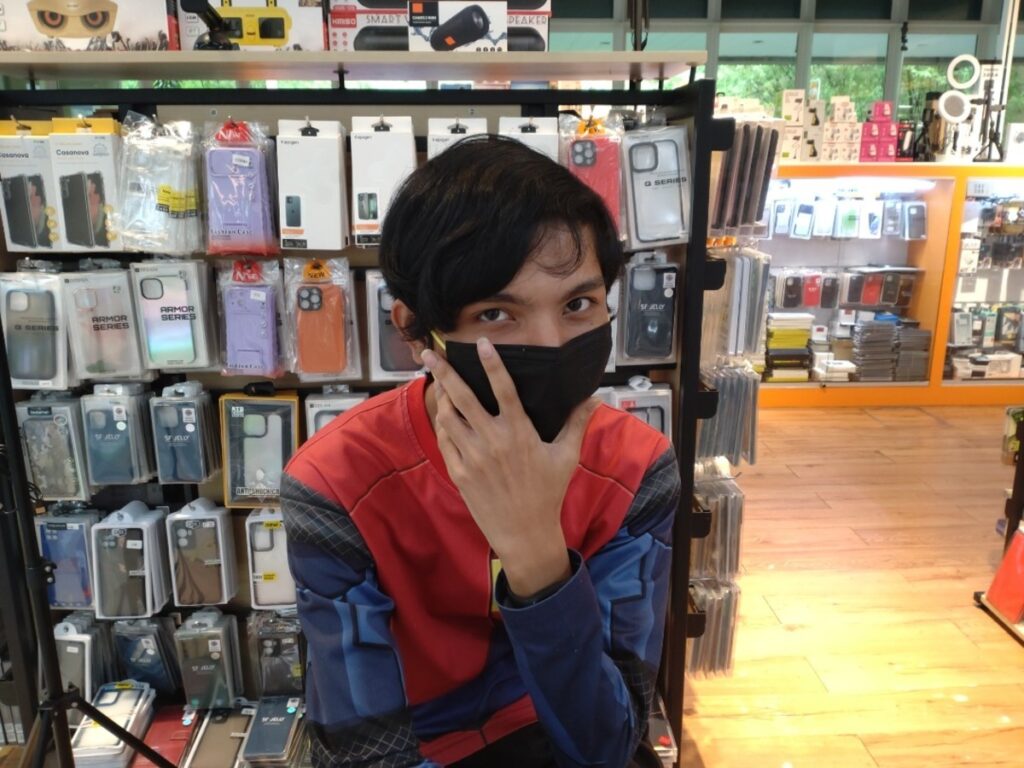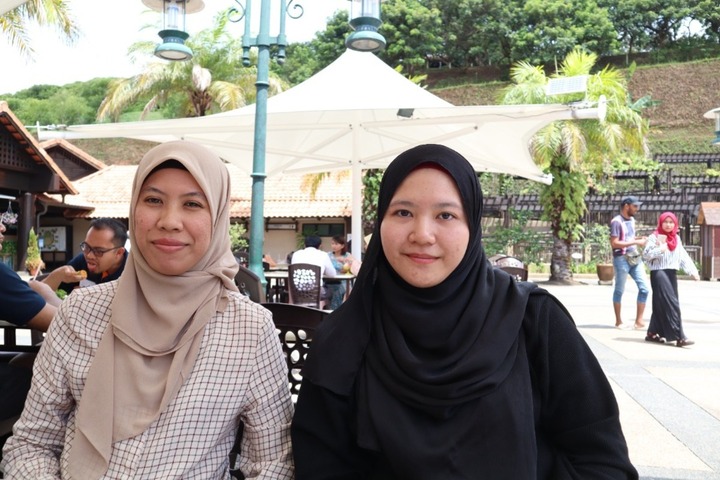PUTRAJAYA, Nov 15 — Putrajaya voters in their 20s and 30s say they are still on the fence, as their questions about the practicality of political parties’ manifestos – especially funding for proposed policies – remain unanswered.
Although supportive of some of the ideas in the various manifestos for the 15th general election, young voters in the country’s administrative capital were apathetic and distrustful of the actual execution of such pledges, citing cost, current problems within the system, and past empty promises as primary reasons for their misapprehension.
Nurnia Kuzairah, a 32-year-old accounts executive, held that she did not have much confidence in the provisions listed in the Perikatan Nasional (PN) election manifesto, saying it was too vague.
“The manifesto needs to be more clear,” Nurnia told CodeBlue in an interview last week, as she looked through PN’s manifesto.
Her friends Nur Fatin Suhaila, 26, and Siti Nur Ameirah, 28, who were sitting with her at a table in the Penanggah Taman Warisan Pertanian Putrajaya food court, also voiced their agreement.
Nur Fatin highlighted PN’s proposed scheme of doctor visits to senior citizens’ houses, saying: “Another thing: right here, the manifesto says they want to introduce a doctors’ home visit scheme. Like, if at the hospital, we have a shortage of doctors, how will the doctors go house to house?”
“Adding to their cost, too,” chimed Siti.
Nur Fatin asked: “Like their travelling cost, will it be borne (by the government)?”
The three young women, experiencing the rising cost of living, were worried that people and doctors would be made to bear such costs. Although they were supportive of the doctors’ home visit scheme, they simply could not see the fulfilment of such promises.
“It’s quite good, because sometimes, those who are bedridden, they can’t move. The visit is quite good, but you have to explain more. How are you going to bear the cost?” Siti questioned.
The lack of specialists in hospitals too is a cause of concern, as the young women suggested that more benefits be awarded to help retain these doctors in the public health care system.
Another area they highlighted was the lack of facilities in public hospitals.
“Facilities are less when compared to private (hospitals) and this, too, has resulted in long waiting times at government hospitals. Maybe many people need the machine, but there are limited machines,” said Nur Fatin.
When asked who they would support in the upcoming elections, all three women echoed their uncertainty.
Tied between the three major political coalitions, but leaning towards PN and Barisan Nasional (BN) – as all they hear from the Pakatan Harapan (PH) are the sins of the previous government and a lack of a plan for the future – the women held that they want to see more detailed and concrete plans from all three coalitions.
The Putrajaya race is contested by four-term incumbent Tengku Adnan Tengku Mansor (BN), former Education Minister Mohd Radzi Jidin (PN), and Noraishah Mydin Abdul-Aziz (PH), besides other candidates for the parliamentary seat.
“I, too, am not sure who to support. Everyone (every party) also like 50-50. Everyone do [for themselves], not for the rakyat,” said Nurnia.
“This manifesto – will they do it?” questioned Fatin.
When it came to bearing medical costs, Siti held that young people should be required to get health insurance, saying: “You can’t depend only on government hospitals.”
“Young people, too, need to be more aware,” added Nur Fatin.
When it comes to ageing, the three women were confident that their Employees’ Provident Fund (EPF) and Social Security Organisation (Socso) savings would see them through retirement and into old age, giving little thought to how they will survive once the money runs out – a problem that many of the elderly find themselves running into.
The Ministry of Finance reportedly said that as of June 30 this year, more than half of EPF’s nearly 13 million members aged under 55, or 6.62 million people, had savings of less than RM10,000. Of that, 3.2 million contributors had savings at the critical level of less than RM1,000.
Muda, which is in an electoral pact with PH, has proposed in its “Kertas Hitam” election manifesto the introduction of a payroll-funded social health insurance scheme to increase health care spending, similar to EPF and Socso contributions, based on sliding scale according to income and age.
The 15th general election sees an additional 6.23 million new voters in the electoral roll, with automatic voter registration and the lowering of the voting age from 21 to 18. Of the 6.23 million new voters across age, 1.4 million are aged 18 to 20.
Yet, despite the huge number of first-time voters, including among young people, election candidates across parties have not included town halls in their campaigns, except PH leader Anwar Ibrahim who did one dialogue session with university students last November 10.
Election candidates, including from Muda, have instead stuck to the conventional one-way campaigning method of ceramah that does not give room for questions from voters.
‘Government Can’t Keep Giving Money To The People’

Luqman, a 21-year-old Putrajaya resident who will be voting in Perak, stated that he was neutral, but if he had to make a choice, he supported Muda, as he has had enough of “these old folks who already lost this vote”.
The young man declined to provide his full name or to state which constituency he would be voting in.
When looking through BN’s election manifesto, Luqman, a store clerk working in Alamanda Shopping Centre, stated that he did not trust the manifesto “100 per cent” due to “experience”.
However, he thought that BN’s proposal to provide RM105 million over five years to non-governmental organisations (NGOs) operating care centres for the elderly and disabled was a good thing, as he finds NGOs to be more trustworthy than the government.
“I think it’s a brilliant idea to give the money to NGOs. I think it is not a big problem if the NGOs here don’t take a profit. I think, based on my opinion, I trust NGOs more than the government.”
Luqman, who holds three jobs, urged the next government to better manage the economy, saying the State cannot constantly be giving money to the people.
“Need to be in line with the economy. How we handle the economy. But, if we just give to people, give to people, give to people, and then the debt keeps on increasing, the debt increases, and then this will make our people not more independent.”
When asked what he thought about increasing the health budget to five per cent of the GDP – a promise made by all three coalitions: PH, PN, and BN – Luqman said, “I think it’s okay for RM77 billion, but based on what economy we are in. Like, look at the economy now. If it is worth it, then go for it. But, if less, maybe the government should reconsider that.”
However, when he viewed the five per cent from the angle of an election promise that ought to be fulfilled, Luqman said: “That’s why I don’t trust them.”
Galen Centre for Health and Social Policy chief executive Azrul Mohd Khalib recently said it was “simply impossible” to increase public health care spending to 5 per cent of Malaysia’s GDP in five years without reforms like earmarking revenue from sin taxes or introducing social health insurance, adding that it isn’t enough to just cut wastage or corruption.
When asked whether he had EPF and Socso, Luqman proudly said that he had both of those provisions and an insurance policy, too, to cover his health needs.
When asked about what he thought of PH’s plan of overcoming retirement poverty through the automatic registration of EPF, irrespective of age; expanding i-Saraan and a starting incentive for first-time voluntary contributions; and allowing parents to start contributing to their children’s EPF at an earlier age, Luqman had this to say:
“If they need to proceed, just proceed. But don’t make it too burdensome on the rakyat.”
Family Planning For B40, Like China’s One-Child Policy
Looking at the picture more holistically, Luqman asserted that Malaysians can’t be too dependent on the government and that they need to take responsibility for their own welfare.
He also stated that the government should focus more on aiding the B40 group in the form of family planning.
“I think it comes from the rakyat sendiri juga. We can’t blame the government 100 per cent. We, too, need to be good in our budgeting. Apart from knowing whether the government is sh*t or not sh*t, we, too, do not know whether we are sh*t or not. So, we need to manage our finances and budget.
“Maybe the government can provide campaigns – for example, like B40, control their family, like family planning. How many children? Like how China does it. Maybe there are some who disagree, but for our economy, I think that’s a great move.”
The one-child policy in China was an official programme initiated in the late 1970s and early 80s by the central government of China. The programme, which came to an end in early 2016, was intended to reduce the growth rate of China’s enormous population.
The implementation of the policy involved the promotion of family planning and the use of birth control, making contraceptives more widely available, offering financial incentives, and preferential employment opportunities to those who complied, while imposing sanctions against those who violated the policy and invoking stronger measures, such as forced abortions and sterilisation.
As he had a medical card, Luqman was hesitant to comment on the affordability of the health care system, but cautiously stated that he thought social health insurance was a great idea.
“Insurance with the government, that is a great idea, but I think there will be a catch, right? I think there will be a catch. Imagine 14 million citizens in Malaysia got insurance, damn that will be hard. Maybe it needs better re-arrangement and budget.”
According to Luqman, many youth like him hold down two to three jobs just to get by and to have a little more spending money to enjoy life.
“Because today, nowadays, many citizens, rakyat Malaysia, choose to work two, three jobs, like me, because we know if we just depend on one job only, there will not be enough. So for this job, I work just to apply for a loan, because this is my fixed work, so it is easier to apply for a loan and then to pay my commitment and so on.”
“But if I go for two jobs, at least I can enjoy with my extra money, like I can go for holiday!” laughed Luqman.
“Yeah, we are humans, right? Not robots. So, we need the extra money to enjoy ourselves in our lives. We know, nowadays, reality is very sh*t. So, we need to enjoy ourselves, but to enjoy, we need money also. So, that is the rakyat Malaysia truth today.”








